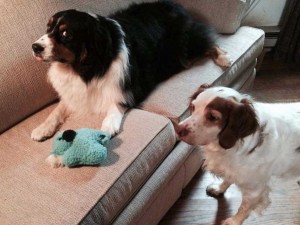The Grand Illusion: Multiple Dog Household Aggression Issues Can Be Confusing
I have written several blog posts on the subject of preventing multiple dog household conflict but none on resolving it. There is a reason for that. Most dog parents who are not behavior professionals are not well versed in the finer points of determining the true cause of the issues at hand. I cannot count how many times I have been told that one dog is at fault only to arrive and see a different story entirely.
Of course, rarely is one personality in the household solely at fault for conflict. It usually takes two to tango. But without a plethora of dog body language knowledge, most people just don’t see the true initial cause. Behavior better off nipped in the bud early on, has been permitted to continue and then not surprisingly, tempers rise. The dog that is eventually blamed for starting things is often only responsible in varying degrees from not at all to an equal partner in crime.
I often see posts on the internet in various venues with multiple dog household parents asking how to solve a conflict within their household. Responses that are in any way different than “Get professional in-home help” serve to frustrate to me to no end. These issues cannot be solved by “dog trainer Facebook” or “dog trainer Yahoo group”. You need experienced eyes on the situation at hand to determine what dynamics are in play. Anything less and not only are all dogs in the household in danger, but so are the humans who happen to be present when any conflict takes place.
Redirection onto a human is a real danger when you are dealing with inter-household aggression and attempting to break up a spat. Relationships are not enough to ensure safety when emotions are at a high point. I happen to have a different opinion on dogs and their use of their teeth than some professional trainers. I do agree that if a dog wanted to bite you in most circumstances and if you just get a muzzle punch or a snap close to skin, then they certainly are just warning you. That is where my agreement usually ends on this subject.
With a dog fight, all bets are off. You CAN get accidentally bitten by the love of your life. Teeth are flashing fast and if you reach in to separate the feuding parties in the heat of the battle, it’s easy to get bitten. Think about a human in the same circumstances. Your emotions are high and a perceived rival attacks you. Someone you love reaches in to prevent you from retaliating and while you are wildly swinging, you give your beloved a black eye. It happens. Very easily. Don’t assume you won’t get bitten because you and your dogs have a great relationship. That would be a very dangerous assumption.
There is no general guideline that exists to repair the divide in inter-household aggression. Relationships don’t exist in a vacuum. The dynamics of any household are complex and complicated. You would not expect to resolve conflict among human household members based on some pre-existing formula that you could refer to. Give the canines in your life the same respect for complexity. You need professional eyes on the situation to determine the root cause of the issue at hand. No two conflicts are identical in any species.
Often, the dynamics that are causing the problem are not immediately evident even to the professional. My initial presence alone will change the dynamics in such a way that just listening and watching while waiting for the dogs in the home to get more comfortable and act more naturally is an important part of the resolution. As is often in these scenarios, the behavior at the root of the issue is something that a dog parent simply considered normal dog behavior. We could be better dog parents overall with an approach to dog rearing that mirrors human parenting. The comparisons are very similar.
In conclusion, I will reiterate that if you have inter-household aggression, then you owe it to your family, both human and canine, to get professional help. If you are not experiencing all out combat in your home but things could be a little less tense, then avail yourself of the previous blog posts that are written to prevent combat and instill a feeling of safety and peace in your multiple dog household.
Fairness in the multiple dog household
Bully dogs in a multiple dog household
Why safety is important to dogs
Feel free to share your inter-household aggression story below.
Posted in: Projects
Leave a Comment (10) →

